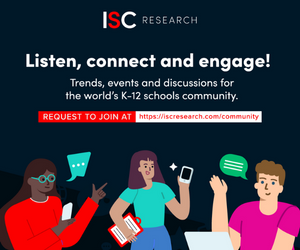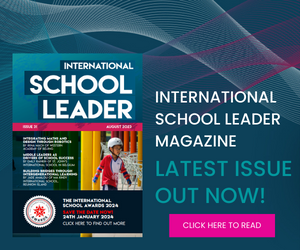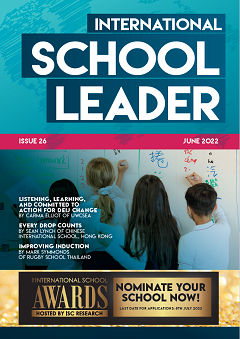By Tatiana Popa
Heritage International School in Moldova was shortlisted for its sustainability initiative by ISC Research at the International School Awards in 2023. To get there, we explained the approach we took as a school to implement sustainability as a top priority, and how we involved everyone in it.
Climate action got our attention during the 2020 COVID-19 lockdown, when we all had to stay inside and isolated for three months. It was a period of lots of online work but also a time for reflection. Most importantly, our wellbeing was affected, without getting sick with COVID-19. Those lucky enough to have a garden and to be able to get outside and breathe fresh air coped much better than those stuck in apartments for months with their entire families.
We started taking little steps towards sustainability before the lockdown, but the pandemic was a turning point in the list of our school priorities. In May 2020, I participated in the T4 virtual conference, where I listened to many inspiring speakers. Among them was an educator from Belgium named Koen Timmers, who spoke about his global Climate Action Project. Being in charge of global education implementation at my school, I thought that was a direction we surely needed as a community. I brought the Climate Action Project to Moldova, as no school in the country was involved in it yet. I got in touch with the project founders and laid the foundation for launching it in Moldova.
The Climate Action Project is a free six-week project that allows teachers and students aged 3 to 21 to collaborate on environmental issues around the world. Over the course of the project, classrooms explore causes and effects of climate change and have the opportunity to develop solutions and take action. Educators get ready-made lesson plans, curriculum and teaching materials for each week of the project. They partner with classrooms in other countries and share findings during lessons. It unites classrooms across 149 countries and culminates with the Climate Action Day conference, where thousands of students, educators and environmental people get together to share their work in one day.
First, I had to promote it across the entire country and to get the Ministry of Education’s official support. I wrote articles in the mass media and got in touch with the Ministry of Education. During the summer, we got educators at my school and across the country to register for the project.
In September 2020, more than 120 educators in Moldova were part of the project. A ‘Heritage team’ of five English teachers got together and translated the project curriculum from English into Romanian so educators in Moldova and Romania who teach other subjects could get involved as well. For Heritage teachers, it is much easier in terms of languages as we are a Cambridge school and English is the lingua franca of our community.
This project was the very first step in our sustainability journey. It is designed in a way that allows for both in-person and online teaching and is easy to introduce in many different school subjects, depending on the topics taught and the teacher’s approach to assigning tasks. One thing is certain: the teacher is free to introduce the project-based learning in the way they see it necessary; all the materials are provided, even weekly lesson plans. Thus, every autumn, from September to November, our Heritage students are actively involved in global collaboration for exploring climate action and sustainability. Schools take action in the way they think best suits their school community.
For Heritage International School, this meant a lot, as I was selected, together with some students, to represent Europe as a continent for the Climate Action Day conference in November 2020. It meant inviting the capital’s mayor and the Minister of Environment to speak at Climate Action Day. It also meant that Heritage teachers implemented the sustainability activities across all levels, both in the primary and secondary levels. This included doing some interdisciplinarity activities, with educators getting together to teach one topic when involved in a climate awareness project or activity, such as the German teacher inviting a group of students from university or doing a classroom activity with another colleague.
When speaking about impact, it is important to mention the collaboration with the wider community. For instance, we collaborated with the British Embassy in Moldova and organised a webinar on climate change, ahead of COP26 in Glasgow, where students and guest speakers spoke about their respective work on stopping climate change. We even planted trees in our school garden and in the Embassy’s garden. We invited speakers from a variety of organisations to talk to our young people about the importance of action. A good example of this was the resident coordinator of the UN Moldova, Mr Simon Springett, who spoke about the UN Sustainable Development Goals and the importance of the work of the UN agencies and individual action.
Little by little, we incorporated our approach to sustainability into other school activities: we introduced meat-free Mondays to reduce the carbon footprint; we started collaborating with the local zoo and farmers to give the leftovers from the school canteen; and we introduced activities in the school calendar that would focus on sustainability.
For Earth Day, we organise the ‘Most Creative Recycled Tree’ competition, where classes in the primary and secondary school design their trees and a team of Student Council members act as judges and evaluate their work. Also, we were selected to showcase worldwide, alongside 24 other schools, our sustainability approach in a live video on Take Action Global’s Instagram account. The Student Council members involved in sustainability activities gave a virtual school tour and told our school story.
Our teachers registered on the eTwinning platform (a European platform for collaboration among schools in Europe) and implemented many projects that won quality labels, in parallel with the Climate Action Project, the Goals Project and the Rethink Plastic project.
Teachers have the freedom to choose what works best for their students in order to have a better impact.
To grow and sustain the initiative, Heritage International School decided to apply and become a Climate Action School in 2022. Thus, our teachers got trained to become climate action educators, and students participate in monthly meetings with other schools on all continents that are part of this programme. Each school got three partners to collaborate with and take action.
Besides this, I was asked to contribute to the FutureLearn course from University College London last summer, entitled ‘Educating for Sustainable Development (ESD) in Schools and Universities’. I recorded some video answers that were later included in the course materials. In this three-week course, educators can gain an overview of the key issues relating to sustainability and how to deliver this knowledge, whether they teach in schools or in higher education.
Here are some tips on how to implement a sustainability initiative at your school:
- Find a programme/project that will fit the needs of your school community
- Make it available to your teachers, provide support and explanations if needed
- Involve your entire school community, not just teachers and students – families can bring their ideas and contribution as well
- Make it visible and attractive
- Involve your student council members – youth voices are very well received
- Talk to the administration – they should be well informed and proactive

Tatiana Popa is Deputy Academic Director and Head of Global Education at Heritage International School in Moldova




